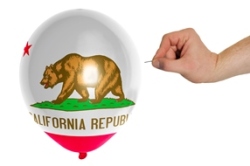November Propositions | California Ballot Initiatives’ Pros & Cons Part 1 of 2
Los Angeles Environmental Lawyer
by Stephen T. Holzer
September 11, 2012
Eleven Propositions will appear on the ballot in November. Though the Secretary of State’s (SOS’s) office has them all listed on their website, we thought it would be a good time to take a look at the pros and cons of each measure.
In this blog, we’ll examine the first six of the 11 propositions we’ll see on the 2012 ballot. We’ll tackle the remaining five, Props 36-40, next week.

To read the Official Title and Summary prepared by the Attorney General, simply click on each numbered Proposition – you’ll be hyperlinked to the appropriate page on the SOS website. We also provided links to the main groups opposing and supporting each proposition, where you may find more than the three reasons we listed to vote either for, or against, a particular proposition.
Proposition 30 – Temporary Taxes to Fund Education. Guaranteed Local Public Safety Funding. Initiative Constitutional Amendment.
This is the Governor’s proposal to increase income taxes on taxpayers earning over $250,000/year and to increase the State sales tax by ¼ cent for four years. Eighty-nine percent of revenue raised would go to K-12 education and the remaining 11 percent would go to community colleges. According to the Secretary of State’s summary, the Proposition would also guarantee funding for public safety services which are being realigned from the State to local governments.
Prop 30 Opposition:
Primarily sponsored by the National Federation of Independent Business California, the Small Business Action Committee, and various Chambers of Commerce and Taxpayers Associations, the naysayers to this proposition claim:
1. The Prop raises sales and income taxes on ALL Californians.
2. It won’t generate new funding for schools.
3. Prop 30 destroys small business and kills jobs.
Prop 30 Support:
The Yes on 30 movement is primarily sponsored by California university organizations, state law enforcement associations, and various community and business groups. They say Prop 30 will:
1. Prevent about $6 billion in school cuts, and provides additional funding.
2. Constitutionally guarantee local public safety funding.
3. Help balance the budget.
Proposition 31 – State Budget. State and Local Government. Initiative Constitutional Amendment and Statute.
This measure proposes a number of intriguing budget tweaks. Proposition 31 prohibits the Legislature from creating expenditures of more than $25 million without either also creating equivalent revenues or identifying equivalent spending cuts.
The Proposition also gives the Governor the authority unilaterally to cut the Budget during fiscal emergencies, provided that the Legislature has been given a chance to act but fails to do so. Further, the measure requires that all bills be publicized at least three days prior to any vote. Finally, the Proposition gives Counties the authority to alter State statues and regulations dealing with spending unless the Counties’ alterations are vetoed by the Legislature within a two-month period.
Prop 31 Opposition:
The No on 31 faction includes the California Labor Federation, California Federation of Teachers, the League of Women Voters, and other organizations. They complain that Prop 31:
1. Is poorly written, leading to lawsuits instead of reform.
2. Shifts $200 million from education and other vital services to fund experimental programs.
3. Leads to a more cumbersome, slower government.
Prop 31 Support:
This measure is supported by the California Republican Party, and a group called California Forward, which claims to transform government through citizen-driven solutions. Prop 31 Supporters say the ballot measure:
1. Forces politicians to be accountable by giving lawmakers and the public time to review legislative proposals.
2. Makes State and Municipal governments clearly identify the benefits of new and existing spending.
3. Benefits business by stabilizing the budget and requiring government at every level to set goals and measure progress.
Proposition 32 – Political Contributions by Payroll Deduction. Contributions to Candidates. Initiative Statute.
If passed, Proposition 32 would restrict the unions’ political fundraising by prohibiting the use for political advocacy of monies deducted for union purposes from employee paychecks. Such use would be permitted only if the employee consents in writing on an annual basis.
The Proposition imposes a similar restriction on corporations’ use of payroll deductions. However, even in the absence of voluntary payroll contributions, corporations would still be free to spend money on political advocacy so long as the expenditures come from other sources of revenue.
Prop 32 Opposition:
Labor unions, particularly those for public employees, constitute the key groups leading the opposition. Among other charges, they claim the proposition will:
1. Place restrictions on union workers while creating special exemptions for corporate interests.
2. Give corporations and lobbyists greater influence.
3. Empower insurance companies, real estate investors and other wealthy supporters to contribute directly to political candidates.
Prop 32 Support:
Supporters of this ballot say Prop 32 reduces the influence of special interest groups because it will:
1. Stop special interest from taking automatic wage deductions from employee paychecks for political purposes..
2. End special treatment by politicians awarding government contracts to companies who make financial contributions to their campaigns.
3. Break the union hold on politicians and government.
Proposition 33 – Auto Insurance Companies. Prices Based on Driver’s History of Insurance Coverage. Initiative Statute.
Proposition 33 if enacted, would permit insurance companies to set premiums based on whether the insured previously carried auto coverage with any insurance company. Also, premiums could be raised where the driver did not previously carry continuous insurance (except for lapses of 90 days or less, lapses caused by military service and lapses due to employment loss).
The biggest opponents to Prop 33 are from Consumer Watchdog, an organization billing itself as a nonprofit dedicated to providing a voice for taxpayers and consumers, and the California Democratic Party. They claim the measure will:
1. Unfairly punish people who stop driving for legitimate reasons, such as unemployment.
2. Hurt drivers who drop coverage while in college, or who temporarily explore other means of transportation (public transit, bicycling to work, etc.).
3. Lead to higher uninsured motorist premiums for all insured drivers.
Prop 33 Support:
According to Drew Joseph of the San Francisco Chronicle, 99 percent of the funding for Prop 33 comes from the chairman of Mercury Insurance, George Joseph. Vocal proponents include the American Agents Alliance and the California Republican Party, who say Prop 33:
1. Rewards California drivers who are always insured by offering them discounts for continuous coverage, even when they switch insurance companies.
2. Empowers continuously covered drivers to shop for better insurance rates.
3. Does not, as the Prop 33 opponents claim, punish drivers who discontinue insurance due to layoffs, for up to 18 months.
Proposition 34 – Death Penalty. Initiative Statute.
Proposition 34 aims to abolish the death penalty and substitute life imprisonment as the harshest criminal penalty meted out by the State. The measure would apply retroactively to any prisoner already sentenced to death, and would require those sentenced to life in prison to work in their prison facility, with wages going to the victims’ families. Prop 34’s initiators estimate state savings of over $100 million a year as a result of not having to prosecute expensive trials and defend against appeals.
Prop 34 Opposition:
Not surprisingly, a number of victims’ families and district attorneys are against Prop 34. They attest that:
1. Studies regarding cost savings to the state are misleading and inflated, as the data was written or collected by the writers of Prop 34.
2. The people on Death Row are serial killers, cop killers and rapists, who may find their way out again if Prop 34 passes.
3. The Death Penalty system should be fixed, not abolished – they recommend using a single drug for executions as well as mending the Appeals Process.
Prop 34 Support:
Those in favor of this proposition carry some weight, including the American Civil Liberties Union, the California Democratic Party, the California Catholic Conference of Bishops – and individuals such as Gil Garcetti and Antonio Villaraigosa. They say:
1. California tax payers will save $130 million per year by imprisoning criminals for life rather than executing them.
2. Convicted criminals will be required to work and pay restitution to a victims’ fund.
3. Innocent people are sometimes wrongfully convicted of, and executed for, serious crimes.
Proposition 35 – Human Trafficking. Penalties. Initiative Statute.
This Proposition would increase penalties for human sex trafficking. Prison would be for 15-years-to-life and fines could be up to $1.5 million per offense. The measure would prohibit the sex trafficking victim’s consensual sexual history to be used against that person in legal proceedings and would also require the police to undergo human-trafficking training. Cost to State and local governments would total several million dollars a year.
Prop 35 Opposition:
Believe it or not, there are a few voices raised against this Proposition, including the California Coalition for Women Prisoners. The CCWP says:
1. The measure can be used as a pretext to label sex workers as pimps and traffickers, which will deter these workers from seeking help when subjected to violence.
2. Prop 35 increases police power to detain and interrogate people under a pretext of looking for trafficked individuals.
3. The Prop gives a vested financial interest to victims’ services and non-profit agencies that work with law enforcement, in the form of fines charged to convicted traffickers.
Prop 35 Support:
Several attorneys general and district attorneys are in favor of Prop 35, and are backed by both California’s Democratic and Republican Parties. Also on board are actress Jada Pinkett Smith, former Privacy Chief of Facebook, Chris Kelly, and the president of the California Police Chiefs Association. Supporters claim the Prop will:
1. Deter traffickers with higher penalties and fines.
2. Use fines to fund services for victims.
3. Require convicted traffickers to register as sex offenders.
That wraps up the first six of the 11 Propositions California voters will see on the November ballot. We’ll look into the remaining five, Propositions 36-40, next week. We’ll also post information about the Los Angeles County ballot measures as we get closer to election day.
Stephen T. Holzer is a Business Litigation Attorney, and Chair of our Environmental Practice Group. Contact him via email: sholzer@lewitthackman.com.
Disclaimer:
This Blog/Web Site is made available by the lawyer or law firm publisher for educational purposes only, to provide general information and a general understanding of the law, not to provide specific legal advice. By using this blog site you understand there is no attorney client relationship between you and the Blog/Web Site publisher. The Blog/Web Site should not be used as a substitute for obtaining legal advice from a licensed professional attorney in your state.

